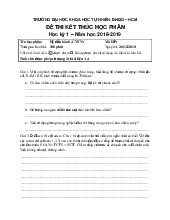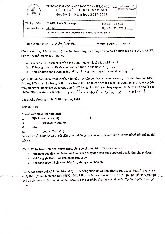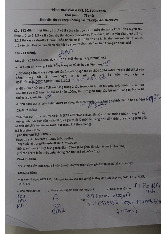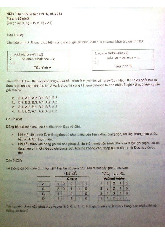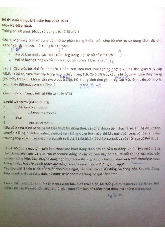

Preview text:
1. A computer with a 32-bit address uses a two-level page table. Virtual addresses are split into a 9-bit
top-level page table field, an 11-bit second-level page table field, and an offset. How large are the pages
and how many are there in the address space? top-level second-level offset 9 11 Tổng = 32 Offset = 32 11 – 9 = 12 bits –
Kích thước trang = 2^n (n số offset) Page size = 2^12 B = 4 KB
Số trang tối đa = 2 ^ số page number
Total number of pages possible = 2^9 x 2^11 = 2^20
2. For each of the following decimal virtual addresses, compute the virtual page number and offset for a
4-KB page and for an 8 KB page: 20000, 32768, 60000. 4 KB = 4096 B
=20000 CHIA LẤY NGUYÊN cho 4096
= 20000 CHIA LẤY DƯ cho 4096 Page number Offset 20000 4 3616 Mấy cái sau 32768 8 0 tính tương tự 60000 14 2656
3. A machine has 48-bit virtual addresses and 32-bit physical addresses. Pages are 8 KB.
How many entries are needed for the page table?
Pages are 8 KB = 2^13 B (1KB = 2^10B)
entries for PAGE TABLE = total VIRTUAL 2^48 = 2^35
memory size / size of single page
Number of entries for page table: 2^13 2^32
Number of entries for inverted page table: = 2^19
entries for IN VERTED PAGE TABLE 2^13
= total PHYSICAL memory size /
Size of page table = số entries của
size of single page
PAGE TABLE x kích thước mỗi entry
4. If FIFO page replacement is used with four-page frames and eight pages, how many page faults will
occur with the reference string 0172327103 if the four frames are initially empty? Now repeat this problem for LRU.
FIFO: 6 page faults (lỗi trang => trang chưa đc nạp lên => chỉ thay ở những cái mới chưa có trong cột) 0 0 0 0 3 3 3 3 3 3 1 1 1 1 1 1 1 0 0 7 7 7 7 7 7 7 7 2 2 2 2 2 2 2 * * * * * * LRU: 7 page faults 0 0 0 0 3 3 3 3 0 0 1 1 1 1 1 1 1 1 1 7 7 7 7 7 7 7 7 2 2 2 2 2 2 3 * * * * * * *
Consider a system in which the memory has the following hole sizes in the following memory order:
1KB, 4 KB, 15 KB, 20 KB, 4 KB, 7 KB, 18 KB, 12 KB, 15 KB, 9 KB
You are given successive requests for program segments in the following order:
10 KB, 5 KB, 3 KB, 2 KB, 19 KB, 9 KB, 24 KB, 10 KB.
For each of the following algorithms, show how the holes get filled for each of the above requests. If a
particular request cannot be satisfied, you can skip it (but do mention which ones cannot be satisfied):
10 KB: 1, 4, 5, 20, 4, 7, 18, 12, 15, 9 10 KB: 1, 4, 15, 20, 4, 7, 18, 2, 15, 9 10 KB: 1, 4, 15, 10, 4, 7, 18, 12, 15, 9
5 KB: 1, 4, 20, 4, 7, 18, 12, 15, 9
5 KB: 1, 4, 15, 20, 4, 2, 18, 2, 15, 9
5 KB: 1, 4, 15, 10, 4, 7, 13, 12, 15, 9
3 KB: 1, 1, 20, 4, 7, 18, 12, 15, 9
3 KB: 1, 1, 15, 20, 4, 2, 18, 2, 15, 9
3 KB: 1, 4, 12, 10, 4, 7, 13, 12, 15, 9
2 KB: 1, 1, 18, 4, 7, 18, 12, 15, 9
2 KB: 1, 1, 15, 20, 4, 18, 2, 15, 9
2 KB: 1, 4, 12, 10, 4, 7, 13, 12, 13, 9 19 KB: Can’t fit
19 KB: 1, 1, 15, 1, 4, 18, 2, 15, 9 19 KB: Can’t fit
9 KB: 1, 1, 9, 4, 7, 18, 12, 15, 9
9 KB: 1, 1, 15, 1, 4, 18, 2, 15
9 KB: 1, 4, 12, 10, 4, 7, 4, 12, 13, 9 24 KB: Can’t fit 24 KB: Can’t fit 24 KB: Can’t fit
10 KB: 1, 1, 9, 4, 7, 8, 12, 15, 9
10 KB: 1, 1, 5, 1, 4, 18, 2, 15
10 KB: 1, 4, 12, 10, 4, 7, 4, 12, 3, 9 First fit Best fit Worst fit
Consider the page table of the figure. Give the physical address
corresponding to each of the following virtual addresses:
(a) 29: Physical address: 8K + 29 = 8221
(b) 4100: Physical address: 4K + (4100 – 4K) = 4100
(c) 8300: Physical address: 24K + (8300 – 8K) = 24
Consider a machine such as the DEC Alpha 21064 which has
64 bit registers and manipulates 64-bit addresses. If the page
size is 8KB, how many bits of virtual page number are there?
If the page table used for translation from virtual to physical
addresses were 8 bytes per entry, how much memory is
required for the page table and is this amount of memory feasible?
Page size = 8 KB = 2^13 B Offset = 13 bits
Bits for virtual page number = (64 13) = 51 –
# of page table entries = 2^51
= Size of page table = 2^51 * 8 B =2^54 B = 2^2 > Virtual Page Size # of Page # of Offset Addressable Address (bits) Frames Virtual Length (bits) Physical Pages Memory 16 256 B = 2^8 2^2 2^8 8 2^10 = 1 KB 32 1 MB = 2^20 2^4 2^12 20 2^24 = 16 MB 32 1 KB = 2^10 2^8 2^22 10 2^18 = 256 KB 64 16 KB = 2^14 2^20 2^50 14 2^34 = 16 GB 64 8 MB = 2^23 2^16 2^41 23 2^39 = 512 GB
